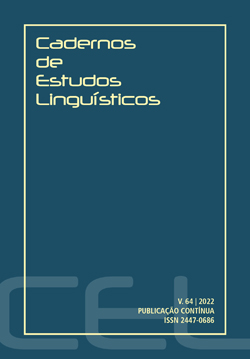Resumo
Neste trabalho analisamos o advérbio bem com leitura de maneira modificando sintagmas verbais do português brasileiro. Partindo da visão de que o sintagma verbal pode ser decomposto em uma estrutura de eventos sintaticamente representada, defendemos que bem de maneira seleciona semanticamente subeventualidades durativas (estados ou processos), e sempre será licenciado em sintagmas verbais que possuam algum componente durativo em sua estrutura de eventos. Na seção final do artigo, mostramos como essa perspectiva explica até mesmo a ocorrência do advérbio bem de maneira em sintagmas verbais encabeçados por verbos tipicamente classificados como culminações (achievements). Com isso, acreditamos que o artigo forneça não só uma descrição robusta das propriedades do advérbio sob análise (pelo menos em sua interpretação de maneira) como também um argumento a favor de pensarmos a estrutura do sintagma verbal não como uma estrutura projetada por um item, mas um arranjo sintático-semântico no qual uma raiz verbal pode ser licenciada.
Referências
ALEXIADOU, Artemis; ANAGNOSTOPOULOU, Elena. Structural Analysis of Unaccusatives. The unaccusativity puzzle: Explorations of the syntax-lexicon interface, v. 5, p. 114, 2004.
BORER, Hagit (2005). The normal course of events. Oxford University Press, Oxford
CASTROVIEJO, Elena; GEHRKE, Berit. A good intensifier. In: JSAI International Symposium on Artificial Intelligence. Springer, Berlin, Heidelberg, 2014. p. 114-129.
CHOMSKY, Noam. The minimalist program. MIT press,1995.
CHOMSKY, Noam. The minimalist program. MIT press, 2015.
CHOMSKY, Noam. 2001. Derivation by phase. In Ken Hale: A Life in Language, ed. Michael Kenstowicz, 1–52. Cambridge, MA: MIT Press.
CINQUE, Guglielmo. Adverbials na Funcional Heads: a cross-linguistic perspective. New York: Oxford University Press. 1999.
CINQUE, Guglielmo. Restructuring and functional heads: the cartography of syntactic structures volume 4. Oxford University Press on Demand, 2006.
CORVER, Norbert. Evidence for DegP. In: North East Linguistics Society. 1991. p. 4.
ERNST, Thomas. Modification of stative predicates. Language, v. 92, n. 2, p. 237-274, 2016.
FLEISCHHAUER, Jens. Degree gradation of verbs. Vol. 2. Düsseldorf University Press, 2016.
GEHRKE, Berit; CASTROVIEJO, Elena. Good manners: On the degree effect of good events. In: Proceedings of Sinn und Bedeutung. 2016. p. 252-269.
GOMES, Ana Paula Quadros; MENDES, Luciana Sanchez. Degree modification in Brazilian Portuguese and in Karitiana. ReVEL, edição especial n. 9, 2015. [www.revel.inf.br]
HALLE, M.; MARANTZ, A. “Distributed Morphology and the Pieces of Inflection”. In: HALE, K.; KEYSER, S. J. (Orgs.). The View From Building Twenty. Cambridge, Mass.: The MIT Press, 1993. p. 110-176.
KATZ, G. (2003). Event arguments, adverb selection, and the Stative Adverb Gap. In E. Lang, C. Maienborn, and C. Fabricius-Hansen (Eds.), Modifying Adjuncts, pp. 455–474. Berlin: de Gruyter.
KENNEDY, Chris. The syntax and semantics of gradability and comparison. University of California, Santa Cruz dissertation, 1997.
KENNEDY, Christopher; MCNALLY, Louise. Scale structure, degree modification, and the semantics of gradable predicates. Language, p. 345-381, 2005.
KRATZER, Angelika. Severing the external argument from its verb. In: Phrase structure and the lexicon. Springer, Dordrecht, 1996. p. 109-137.
KRATZER, Angelika. Building statives. In: Annual Meeting of the Berkeley Linguistics Society. 2000. p. 385-399.
KRATZER, Angelika. Building resultatives. In: Event arguments: Foundations and applications. Max Niemeyer Verlag, 2011. p. 177-212.
LARSON, R. 1998. Events and modification in nominals. In Proceedings from Semantics and Linguistic Theory (SALT) VIII, ed. D. Strolovitch and A. Lawson, 145–168. Ithaca, NY: CLC Publications, Cornell University.
MCNALLY, Louise; KENNEDY, Christopher. Degree vs. manner well: A case study in selective binding. In: Advances in generative lexicon theory. Springer, Dordrecht, 2013. p. 247-262.
MAIENBORN, C. (2005). On the limits of the Davidsonian approach: The case of copula sentences. Theoretical Linguistics 31.3, 275–316.
MAIENBORN, C.: 2004 (Ms., forthcoming), On Davidsonian and Kimian states, in I. Comorowski & K. v. Heusinger (eds), Existence: Semantics and Syntax. Berlin: Springer.
MAIENBORN, C.: 2005, On the Limits of the Davidsonian Approach: The Case of Copula Sentences (Target Article), Theoretical Linguistics 31-3, 275-316
MARANTZ, Alec. “No Escape from Syntax: Don’t Try Morphological Analysis in the Privacy of Your Own Lexicon”. University of Pennsylvania Working Papers in Linguistics, v. 4, n. 2, 1997.
MARANTZ, Alec. Words. Manuscrito, 2001.
MARANTZ, Alec. Argument structure and morphology: noun phrases that name events. Hand-out, New York University, 2006.
MARANTZ, Alec. Restitutive re-and the first phase syntax/semantics of the VP. University of Maryland, 2007.
MARANTZ, Alec. Verbal argument structure: Events and participants. Lingua, v. 130, p. 152-168, 2013.
MCNALLY, L.; C. KENNEDY (2013). Degree vs. manner well: A case study in selective binding. In J. Pustejovsky, P. Bouillon, H. Isahara, K. Kanzaki, and C. Lee (Eds.), Advances in Generative Lexicon Theory, Text, Speech and Language Technology, vol. 46, pp. 247–262. Dordrecht: Springer.
MEDEIROS, A. B. Prefixos, recursividade e a estrutura do sintagma verbal. Revista do GEL, v. 13, n. 1, p. 56-86, 2016.
MEDEIROS, A. B. Considerações sobre a estrutura argumental dos verbos. In: MEDEIROS, A. B.; NEVINS, A. (Orgs.). O apelo das árvores: estudos em homenagem a Miriam Lemle. São Paulo: Pontes, p. 231-298, 2018.
MITTWOCH, A. (2005). Do states have a Davidsonian argument? Some empirical considerations. In C. Maienborn and A. W¨ollstein (Eds.), Event Arguments: Foundations and Applications, pp.69–88. T¨ubingen: Niemeyer.
PARSONS, Terence. Events in the semantics of English: A study in subatomic semantics. 1990.
PYLKKÄNEN, L. Introducing Arguments. Tese (Doutorado em Linguística) – MIT, Cambridge MIT Press, 2002.
PYLKKÄNEN, L. (2008). Introducing arguments (Vol. 49). MIT press.
RAMCHAND, Gillian. Verb meaning and the lexicon: A first-phase syntax. Cambridge: Cambridge University Press, 2008.
TESCARI NETO, A. Sintaxe Gerativa: uma introdução à cartografia sintática. Campinas: Editora da Unicamp, 2022.
ZAMPARELLI, Roberto. Layers in the determiner phrase. 1995. Tese de Doutorado. University of Rochester.

Este trabalho está licenciado sob uma licença Creative Commons Attribution-NonCommercial 4.0 International License.
Copyright (c) 2022 Cadernos de Estudos Linguísticos


